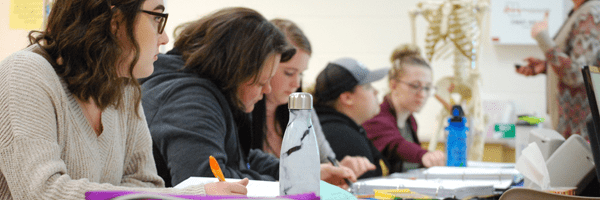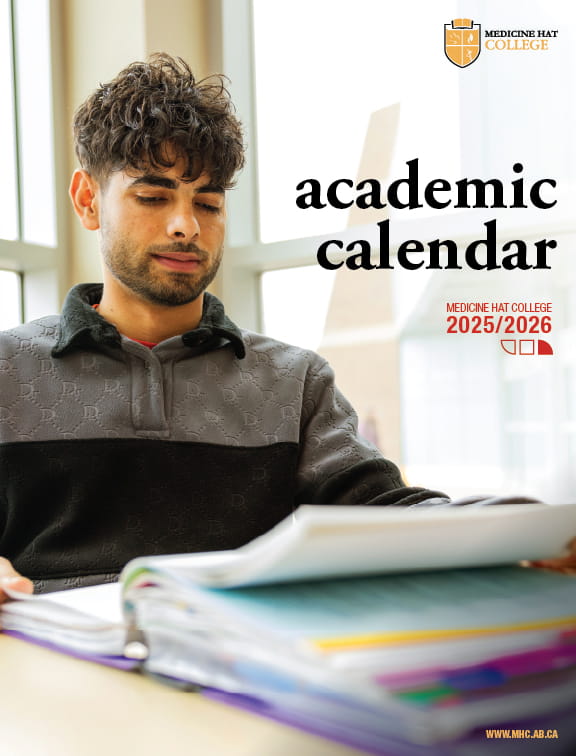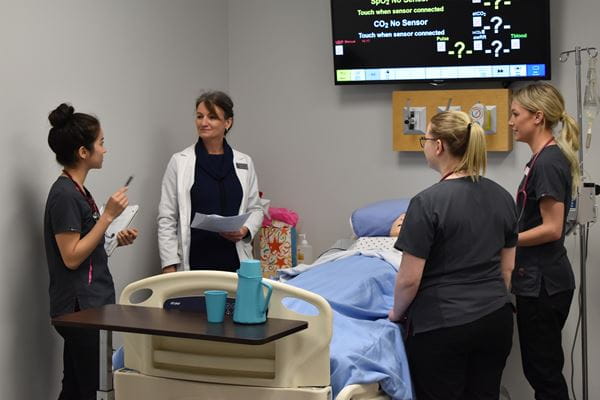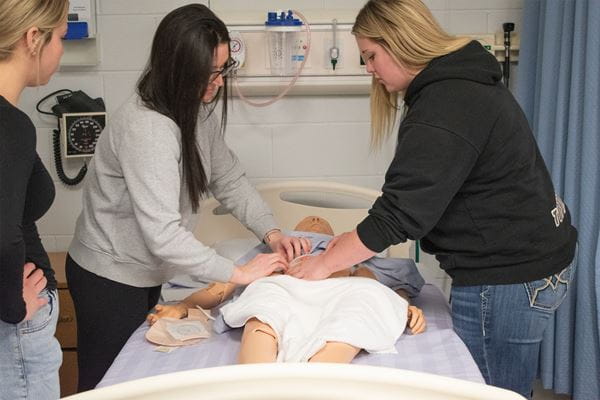Earn your Paramedic degree at Medicine Hat College
When lives are on the line, the skills and knowledge of a paramedic can make the difference between life and death. The Bachelor of Applied Health Science – Paramedic degree program prepares learners to be an integral part of the health care team, primarily within the pre-hospital environment.
Please Note: The Bachelor of Applied Health Science- Paramedic Applied Degree is a competitive entry program. Meeting minimum published admission averages does not guarantee entry to the program.
ALREADY A PRACTICING PARAMEDIC? The Bachelor of Applied Health Science Paramedic degree entry is open to Practicing Paramedics (ACP) with pre-existing credentials and exists to meet the emerging needs of patients, practitioners, and employers.
Learn more about this post-diploma option
MHC’s Bachelor of Applied Health Science (Paramedic) Degree has been created to meet the emerging needs of patients, practitioners and employers. It enables you to move seamlessly through the various levels of preparation for careers in Emergency Medical Services, ultimately allowing you to attain the Advanced Care Paramedic Diploma or to continue on to the Bachelor of Applied Health Science Paramedic Degree.
Prospective students must be mature and highly motivated to deal with the stress of emergency care, critical care and shift work. Paramedics must think independently, exercise good judgment, communicate effectively with others and work well in multidisciplinary environments. The training provided not only addresses the necessary skills of a paramedic but also the skills required to perform with confidence in a variety of situations, effectively interact with others and maintain professional decorum whether in simple or complex situations.
There is a high demand for paramedics who are employed by public and private ambulance services provincially, nationally and internationally. Paramedics also work in a variety of industrial and community-based emergency health settings.
Professional Info: The program prepares practitioners in accordance with the Paramedic Association of Canada’s National Occupational Competency Profile, and equips the student to write the Canadian Organization of Paramedic Regulators (COPR) registration examinations. The program also prepares practitioners in accordance with the Pan-Canadian Essential Regulatory Requirements (PERRs) Canadian Paramedic Competence Framework (CPCF), and also supports the Paramedic Association of Canada’s National Occupational Standards for Paramedics (NOSP), promoting standards for paramedics nationally.
This program is approved through the Alberta College of Paramedics which signifies that our paramedic program has met provincial/national standards and that the education provided is relevant to current clinical practice. Ensuring that paramedics have the required competencies for entry to practice is an important contribution to Canada’s health system.
As the curriculum bridges the student through the Primary Care Paramedic (PCP) scope towards the Advanced Care Paramedic (ACP), the program at MHC does not have a standalone PCP section, however students may exit the program following the completion of all PCP didactic theory, competencies, and practicums. Student transcripts will reflect the completion of the PCP criterion so students can challenge the registration exam. (Please note: the PCP completion point occurs after year one when practicums are completed between July and end of August. Students may need to return in early September of year 2 to attain any deficient competencies. Please refer to program coordinator for more information). Students will exit the program in year 3 with the ACP diploma following all didactic theory, practicums, and attainment of all competencies. The fourth year (Applied Degree section) is available to students following graduation at a time of their choosing via distance learning and not face-to-face at Medicine Hat College.
Applied Degree Continuation (Current/Graduate Students from Medicine Hat College)
As a graduate of the diploma portion
of the program, you may continue your studies with the college and
complete the remaining 8 courses within the Bachelor of Applied Health
Studies (Paramedic) degree section.
Please speak with an ACADEMIC ADVISOR for more information.
Please note: the application deadline for this program is April 20, 2026.
High School
Overall average of at least 60% and a minimum mark of 50% in
- ELA 30-1
- Biology 30
- Math 30-1 or Math 30-2
- One 30-level, 5 credit subject (Chemistry 30 is recommended)
Mature Student
Overall average of at least 60% and a minimum mark of 50% in:
- ELA 30-1
- Biology 30
- Math 30-1 or Math 30-2
Transfer Route
Students require ELA 30-1, Biology 30 and Math 30-1 or 30-2 however, previous post-secondary coursework can be considered. Successful completion of a PCP/EMT or EMR program provides applicants a competitive average boost if you are deemed qualified – for more information contact admissions.
English Language Proficiency
For the International English Language Testing System (IELTS) students must have an overall band score of 7.0 with no band score less than 7.0.
First Year
Summer Semester
- PARA 105 - Paramedicine Driver Operator Course (APDOC)
Fall Semester
- BIOL 275 - Basic Human Anatomy and Physiology I
- IDST 100 - Introductory Communications for Helping Professionals
- PARA 100 - Foundations of Paramedic Practice I
- PARA 120 - Foundations of Paramedic Practice II
Winter Semester
- BIOL 277 - Basic Human Anatomy and Physiology II
- KNES 247 - Introduction to Wellness, Fitness and Nutrition
- PARA 115 - Professional Communications for Paramedics
- PARA 125 - Assessment and Diagnostics
- PARA 130 - Introduction to Paramedic Management of Emergency Situations
Spring Semester
- PARA 145** Introduction to Primary Care Practice
- PARA 150** Primary Care Practice
Second Year
Fall Semester
- PARA 200 - Introduction to Advanced Care
- PARA 215 - Pharmacology for the Prehospital Professional
- PARA 220 - Paramedic Management of Trauma and Environmental Conditions
- PHSL 200 - Pathophysiology
- PSYC 201 - Introduction to Psychology II - Social Science
Winter Semester
- IDST 485 - Death and Dying
- PARA 205 - Mental Health for First Responders
- PARA 230 - Skills and Practice in Patient Modalities
- PARA 240 - Management of Special Population Groups
- PHIL 313 - Bioethics
Spring Semester
- PARA 210 -Advanced Critical Care Practice
Third Year
Fall Semester
- PARA 300 - Advanced Care Paramedic Practice I
- PARA 305 - Advanced Paramedic Care
Winter Semester (Diploma Exit Only)
- PARA 310 -Advanced Care Paramedic Practice II
Fourth Year (Applied Degree Completion via online learning)
- MGMT 243 - Human Resources Management
- PHIL 313 - Bioethics++
- STAT 333 - Statistics for the Life Sciences
- PARA 452 - EMS and the Canadian Health System
- PARA 453 - Community Focused Theory
- PARA 454 - Leadership in Health Care
- PARA 455 - Research
- PARA 470 - Paramedic Work Term I
- PARA 480 - Paramedic Work Term II
NOTES:
EMR completed within the previous three calendar years may apply for transfer credit for PARA 100.
** EMT/PCP from an Accreditation Canada accredited program and completed within the previous three calendar years may apply for transfer credit for PARA 100, PARA 115, PARA 120, PARA 125, PARA 130, PARA 145 and PARA 150. Awarding of credit is also dependent on work experience since the time of EMT/PCP program completion. Program specific guidelines for awarding of transfer credit are available from the Program Coordinator.
++For students that did not complete the Medicine Hat College diploma.
There is a high demand for paramedics who are employed by public and private ambulance services provincially, nationally and internationally. Paramedics also work in a variety of industrial and community-based emergency health settings.
Additional Information
Pre-Professional Requirements
After being admitted into the program, but before the documentation deadline outlined in the application letter, the following must be provided:
- proof of current CPR with the Heart & Stroke Heartsaver AED (C) CPR or BLS Provider.
- Students in the Paramedic program are required to meet the immunization as identified by Alberta Health Services guideline and submit proof of immunization. Students who do not meet the requirements will not be able to complete placements as required in the program. Immunization requires may change during the program.
- a recent Police Information Check (within two months) prior to the first day of classes. Periodic police information checks may be required prior to practicum and work experience to maintain current status throughout the program and to comply with provincial laws. Students are obligated to inform the Program Coordinator immediately of any change in the status of their criminal record.
Post Diploma Degree Completion – Practicing Advanced Care Paramedics
The Bachelor of Applied Health Science - Paramedic (BHSc-P) is designed to build on the previous knowledge and experience of practicing paramedics. Qualified candidates are able to obtain the BHSc-P by completing the nine courses offered in the program.
- ELA 30-1
- Advanced Care Paramedic Credential from an accredited and recognized Canadian post-secondary institution or Advanced Care Paramedic license in the student’s province of residence
Registration Exams
For employment purposes, students may elect to challenge the Canadian Organization of Paramedic Regulators (COPR) registration examinations for both PCP (second year) or ACP (post-graduation at the diploma). This is not a requirement of the program nor the Alberta College of Paramedics to remain in good standing within the program. All costs related to registration, travel, accommodation, and meals are the student’s responsibility. Further information is available on the COPR website.
Fitness Requirements
A career as a Paramedic requires a high level of physical and emotional well-being. Students must be able to demonstrate the physical capabilities to safely maneuver stretchers and equipment and be emotionally capable to deal with trauma and high stress situations. In the event of illness students must present a medical clearance certificate prior to returning to the program.
Professional Driving Improvement: Course Requirements
Students will be required to successfully complete the Professional Driving course. The focus of the course is on demonstrating knowledge of acts and regulations pertaining to ambulances in Alberta. Collision avoidance, performing vehicle inspections, and ambulance specific driving maneuvers will be reviewed. This course must be successfully completed by the end of the first year of the program. Students will be responsible for paying the cost associated with the course. Further information about course offering, registration and costs to be communicated by program to accepted students.
Uniforms
Students will be required to buy uniforms and appropriate foot wear. Uniforms will be ordered in the first semester of the program. Students will also be responsible for purchasing a pen light, stethoscope, trauma shears, trauma glasses, and an emergency vest.
Electronic Charting
Students may need to purchase a WiFi enabled device for completing patient care reports and competency tracking during practicum. Further information will be provided within the first semester.
Required Withdrawal
Students will be required to withdraw if they fail to obtain satisfactory standing in a second attempt at a PARA course that they have failed. (Please refer to Medicine Hat College Academic Policies regarding further details related to probation and dismissal)
As a student in the paramedic program you are expected to exercise responsible conduct that reflects favourably on you, the program and the Medicine Hat College. Please refer to social guidelines for further details related to dismissal.







